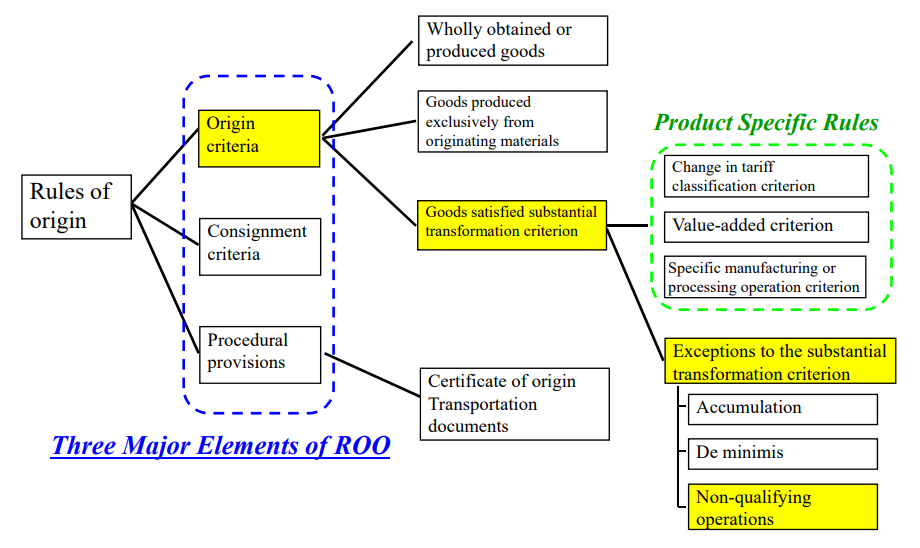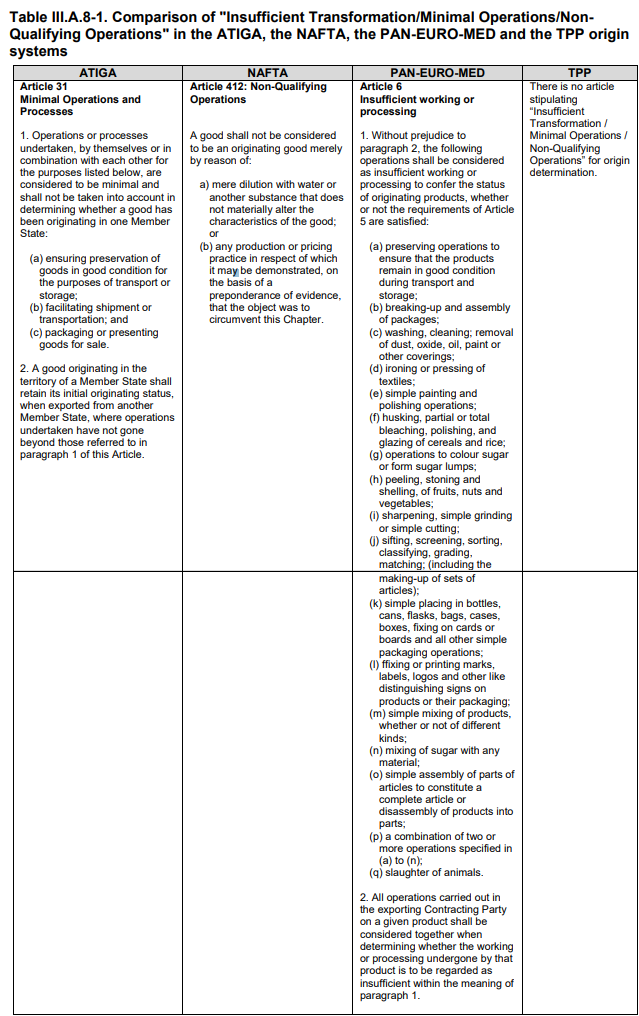A good shall not be considered to satisfy the requirement of CTC rule or
process rule set out in PSR by having undergone specific operations.

Retrieved from: Outline of Rules of Origin for EPA in Japan
Some processes are recognized as simple/minimal and cannot be counted towards meeting
the Rules of Origin (ROO) regardless of the origin criteria of the Free Trade Agreement.
Even if these processes are undertaken as a combination with each other, it does not
confer origin to a good. Examples of such processes are:
a) Ensuring the preservation of goods in good condition for the purposes of transport or storage;
b) Facilitating shipment or transportation;
c) Packaging or presenting goods for sale; and
d) Washing, cleaning, removal of dust.
Applicants are advised to refer to the Minimal Operations and Processes list indicated in the
specific FTA for more information.

Retrieved from:Comparative Study on Preferential Rules of Origin
In order to ensure that only manufacturing processes that fall within the range of substantial
transformation count as origin conferring processes, most origin legislations contain
provisions outlining lists of operations which are considered to have only minor effects on
the final goods;
these minor operations do not confer origin even where the applicable origin rule would have
been satisfied by fulfilling of a change of tariff classification rule or an ad valorem rule
included in the list of product specific origin rules.
Insufficient operations carried out individually, or even in combination,
will never confer origin to a final product.
However, if a manufactured product achieves its originating status through the
operations that go beyond the insufficient operations, it does not matter if the product is,
in addition, subjected to one or more minimal operations.
Most origin provisions offer fairly similar structures for operations which are considered not
substantial in terms of conferring origin, based on the recommendation contained in the
Kyoto Convention.
However, the list of such operations may differ from agreement to agreement, although
by and large the same kinds of operations can be found in many origin legislations.
Rules on insufficient transformation/minimal operations are generally outlined in
specific articles found in the regime-wide origin provisions.
In some origin models, these rules are described under the general origin criteria of
the sufficient transformation requirement. Normally, the operations deemed
insufficient are listed with more or less precise indications to identify their nature.
In certain agreements there is also a definition of the term “simple”,
as in “simple mixing”, “simple assembly”, etc.
Revised Kyoto Convention, Specific Annex K, Chapter 1
Operations which do not contribute or which contribute to only a small
extent to the essential characteristics or properties of the goods,
and in particular operations confined to one or more of those listed below,
should not be regarded as constituting substantial manufacturing or processing:
(a) operations necessary for the preservation of goods during transportation or storage;
(b) operations to improve the packaging or the marketable quality of the goods or to
prepare them for shipment, such as breaking bulk, grouping of packages, sorting and
grading, repacking;
(c) simple assembly operations;
(d) mixing of goods of different origin, provided that the characteristics of the resulting
product are not essentially different from the characteristics of the goods which have
been mixed.
These operations may be called insufficient working or processing, non-qualifying operations,
minimal operations and processes or simply operations that do not confer origin, or minor
processing treatment.
Some origin legislations contain very comprehensive lists of insufficient
transformation/minimal operations, whereas others contain less exhaustive lists,
or no list at all.
This is due to the fact that in certain legislations many of the product specific rules are
based on value added criteria, whereas in other legislations the product specific list
rules are more detailed and are adjusted to the individual products, and each
specific list rule may describe more precisely the required sufficient transformation
requirement in terms of that specific product.
Japan/Thailand EPA “Non-qualifying operations” (Art.31)
(a) operations to ensure the preservation of products in good
condition during transport and storage (such as drying, freezing,
keeping in brine) and other similar operations;
(b) changes of packaging and breaking up and assembly of packages;
(c) disassembly;
(d) placing in bottles, cases, boxes and other simple packaging
operations;
(e) collection of parts and components classified as a good pursuant
to Rule 2(a) of the General Rules for the Interpretation of the Harmonized System;
(f) mere making
(f) mere making-up of sets of articles; or up of sets of articles; or
(g) any combination of operations referred to in subparagraphs (a)
through (f) above.
Comparison of “Non-qualifying operations”
In order to ensure that only manufacturing processes that fall within the range of substantial
transformation count as origin conferring processes, most origin legislations contain
provisions outlining lists of operations which are considered to have only minor
effects on the final goods;
these minor operations do not confer origin even where the applicable origin rule would
have been satisfied by fulfilling of a change of tariff classification rule or an ad valorem rule
included in the list of product specific origin rules.
Insufficient operations carried out individually, or even in combination, will never confer
origin to a final good. However, if a manufactured good achieves its originating status
through the operations that go beyond the insufficient operations, it does not matter if
the product is, in addition, subjected to one or more minimal operations.
In the PAN-EURO-MED context such operations are called
“insufficient working or processing”, whereas in the NAFTA context they are called
“non-qualifying operations” and in the ATIGA context they are called
“minimal operations and processes”. Operations which are considered not to confer
origin may also be called “minimal operations” or “minimal processing” or simply
“operations that do not confer origin” or “minor processing treatment”.
In the TPP origin provisions there is no list of operations that do not confer origin to
a manufactured product.
However in cases where an importing party applies a different tariff treatment to
other parties for the same originating good at the time a claim for preferential
treatment is made, the concept of minimal operations for such goods applies in order to
determine the applicable rate of the customs duty.
The most comprehensive lists on insufficient transformation/minimal operations are
found in the PAN-EURO-MED origin rules.
The ATIGA origin legislation contains less exhaustive lists on minimal operations than
the PAN-EURO-MED origin rules. The NAFTA model on the other hand, only contains
a small description of non-qualifying operations, while the TPP has no list for minimal
processes at all. This is due to the fact that in the PAN-EURO-MED origin systems,
many of the product specific rules are based on value added criteria whereas the product
specific list rules in the NAFTA and TPP systems are more detailed and adjusted to the
individual products where each specific list rule may describe more precisely the required
sufficient transformation requirement adjusted to the specific product.

Retrieved from:Comparative Study on Preferential Rules of Origin
